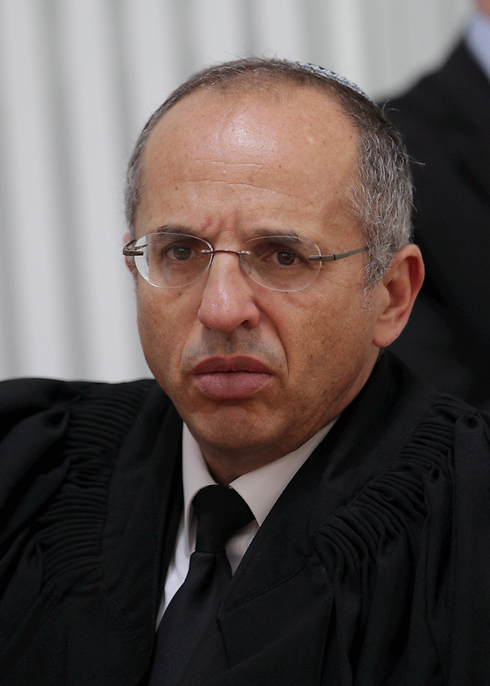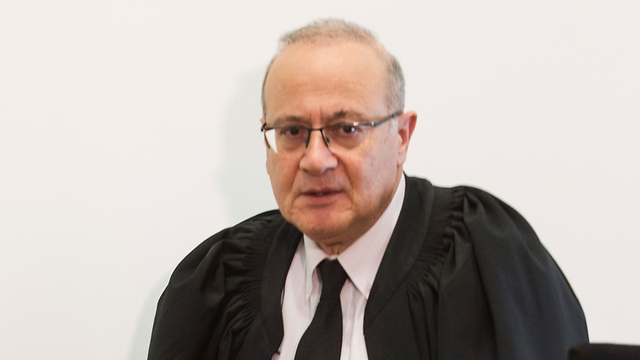
Court doubles sentence of border cop for negligent homicide of Palestinian
Two of three Supreme Court justices overturn original April decision to sentence Ben Deri to 9 months in prison for shooting dead a Palestinian who approached security personnel in Beitunia four years ago after participating in violent riots; 'Original sentence was not close to reflecting the severity of a deliberate act' of switching rubber bullets for live rounds.
The ruling came after two of three judges in the Supreme Court voted in favor of doubling the sentence to 18 months, a mere four months after the District Court ordered that Deri serve nine months behind bars.
In April, the Jerusalem District Court also handed Deri an additional six-month suspended sentence and ordered him to pay the Palestinian teen's family NIS 50,000 in compensation.
Prosecutors had originally filed full manslaughter charges against Deri, accusing him of deliberately switching his rubber bullets for the live round. The amended indictment agreed to by Deri and approved by the Jerusalem District Court as part of a plea deal, described the switch as accidental.
The incident was caught on camera and the video was circulated around the world.
“A soldier or policeman who finds himself in a combat situation can make mistakes and his actions must be examined against a background of the complex situation,” wrote Justice Noam Sohlberg, who drafted the explanation behind the majority decision.
“The gun that was given to Deri in order to save lives was used—due to malicious intent against the victim and serious negligence that accompanied it—to shed blood. Deri failed in this test and he must be held accountable,” the judge wrote.
Sohlberg also criticized the original sentence given to Deri. “At the end of the day, in the overall balance, the sentence did not grant appropriate expression to the value of human life that was cut short by Deri, nor to considerations based on the obligation to adhere to the principle of purity of arms,” he said.
“The double negligence by Deri by the fact that he did not make sure that the magazine contained either blank cartridges and didn’t load a rubber bullet in his gun is grave. But what is even more grave is Deri’s intention to harm the victim when he constituted no threat to the forces and the result was death,” Sohlberg continued.
The sentence imposed on Deri, Sohlberg emphasized, was “not close to reflecting the severity of a deliberate act as this, which adds to it the serious negligence that caused the deceased's death.
“Huge responsibility falls on a soldier and policeman who carries a weapon. A ‘trigger happy finger’, nor a heavy hand (is acceptable). A responsible hand must be on the trigger, and a distinction must be drawn between saving a life and shedding blood,” he added.
Justice Yosef Elron explained his reasons for opposing the decision to double the prison sentence.
“I believe that there is no reason to reject the possibility that even though an objective observation shows that ‘there was no danger posed (by the deceased)’, as was written in the amended indictment, the respondent felt a subjective feeling of danger or a threat from the deceased, who participated in throwing rocks and riots, and a mere four minutes afterwards marched toward the forces for a reason that is unclear, in a manner that absolutely could have aroused suspicion of the respondent,” he said.
Elron also pointed out that at the time of the incident, Deri had under his command a soldier in mandatory service who “was sent by the state to carry out his job.”
“The respondent was confronted by a wave of rioters, an enraged crowd, who were throwing rocks at him in order to hurt him. In these circumstances, he sensed a threat to his life,” Elron wrote.
“For that reason, we must act with extra caution while we are assessing the actions of members of the security forces around operational activity or in combat situations,” the lone dissenting judge urged, adding the importance of taking into account the conditions in the field, the feelings experienced by the security personnel and their actions taken in real time.
While acknowledging that Deri had caused death and that he needed to be held to account, Elron insisted that the a malicious intention could not be attributed to the officer.
“His actions should not be considered punitive but rather viewed against a background of circumstances surrounding the incident,” he concluded.














